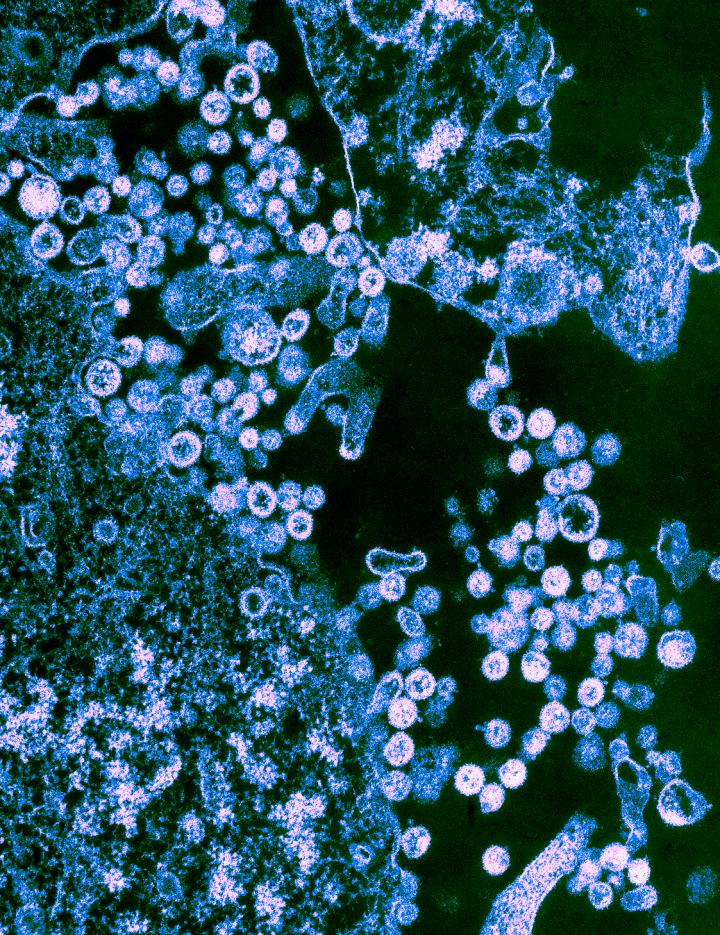
Credit: University of Texas Medical Branch
WHAT:
Scientists funded by the National Institutes of Health have developed an investigational vaccine that protected cynomolgus macaques against four types of hemorrhagic fever viruses endemic to overlapping regions in Africa. The University of Texas Medical Branch in Galveston and Profectus BioSciences of New York are developing and testing the candidate quadrivalent VesiculoVax vaccine, with support from NIH’s National Institute of Allergy and Infectious Diseases (NIAID) and Redeemer’s University in Nigeria.
The newly published study in the Journal of Clinical Investigation describes how the vaccine was created using a live-attenuated (weakened) vesicular stomatitis virus to deliver proteins that elicit protective immune responses. The proteins are from Ebola virus (Kikwit strain), Sudan virus (Boniface strain, which also causes Ebola virus disease), Marburg virus (Angola strain) and Lassa virus (Josiah strain). There are no licensed vaccines to provide protection from any of those viruses–all of which can cause severe disease and death–although the European Medicines Agency has recommended licensing a VSV-Ebola vaccine.
Importantly, the monkeys infected in the study were exposed to different strains of Sudan virus (Gulu) and Lassa virus (0043/LV/14) than those in the candidate vaccine to help the researchers determine whether the vaccine would be cross-protective. Lassa 0043/LV/14 is circulating in an outbreak in Nigeria that began in 2018. Previous studies indicate that the investigational Ebola virus (Kikwit) vaccine will protect against other strains of Ebola virus.
The scientists inoculated 20 macaques with a primary and booster dose of quadrivalent VesiculoVax. The animals had five blood draws to check for an immune response, including on the day of initial vaccination and on days 10 and 28, then on day 56 when they received a booster inoculation, and again on day 66. On day 84 scientists infected the macaques with the four different hemorrhagic fever viruses and monitored them to day 112.
Twelve additional macaques in the study who were infected with the four viruses but not vaccinated all became sick, but none of the vaccinated animals did. Only one of the 20 vaccinated animals had any of the four hemorrhagic fever viruses detectible (Lassa) following the study.
The scientists state that the addition of the Lassa virus component to their multivalent vaccine is an exciting research advance as they already had developed an investigational trivalent vaccine that provided protection against Ebola, Sudan and Marburg viruses. The researchers now plan further vaccine tests against other strains of Lassa virus, and they want to further evaluate whether a single-dose quadrivalent vaccine appears safe and effective.
###
This research was supported by NIH/NIAID intramural funding, contract HHSN272201700077C, and grants UC7AI094660 and U19AI142785; and by NIH/NHGRI grants U01HG007480 and U54HG007480.
ARTICLE:
R Cross et al. Quadrivalent VesiculoVax vaccine protects nonhuman primates from viral-induced hemorrhagic fever and death. Journal of Clinical Investigation. DOI: 10.1172/JCI131958 (2019).
WHO:
Heinz Feldmann, M.D., Ph.D., chief of NIAID’s Laboratory of Virology, is available to comment on this study.
CONTACT:
To schedule interviews, please contact Ken Pekoc, (301) 402-1663, [email protected].
NIAID conducts and supports research–at NIH, throughout the United States, and worldwide–to study the causes of infectious and immune-mediated diseases, and to develop better means of preventing, diagnosing and treating these illnesses. News releases, fact sheets and other NIAID-related materials are available on the NIAID website.
About the National Institutes of Health (NIH): NIH, the nation’s medical research agency, includes 27 Institutes and Centers and is a component of the U.S. Department of Health and Human Services. NIH is the primary federal agency conducting and supporting basic, clinical, and translational medical research, and is investigating the causes, treatments, and cures for both common and rare diseases. For more information about NIH and its programs, visit http://www.
NIH…Turning Discovery Into Health®
Media Contact
Ken Pekoc
[email protected]
301-402-1663
Related Journal Article
http://dx.




